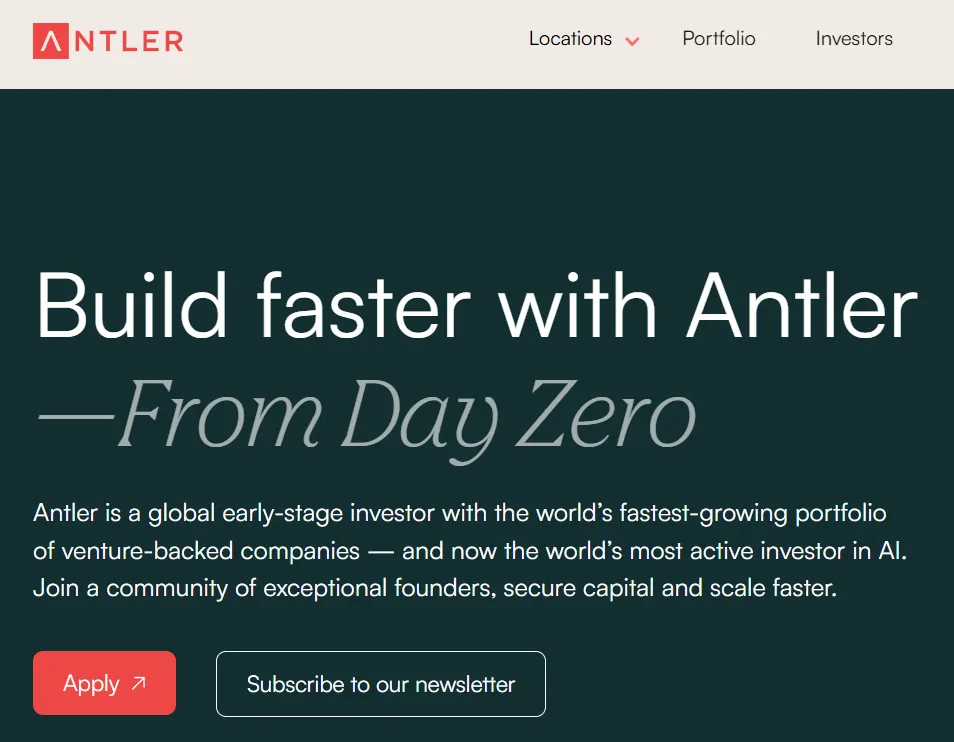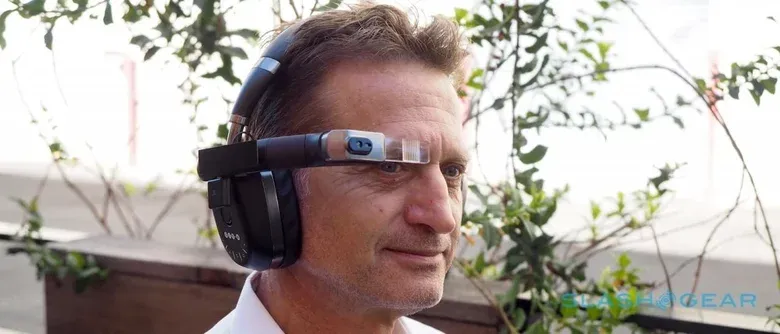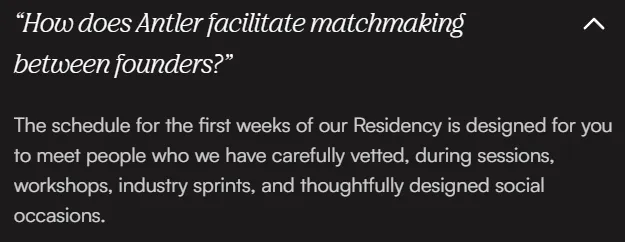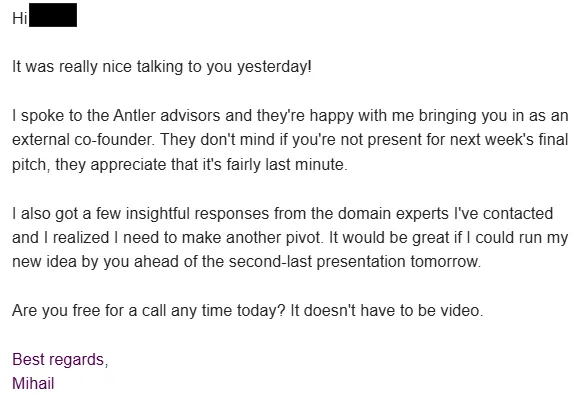6 years ago, I joined Antler’s startup incubator program in London 💂👑🫖. While my time there wasn’t a success, I often get asked about the experience; so I figured I should write about it!
What is Antler?

Antler is an early-stage investor which, through its program, creates the startups it funds. The program lasts 3 months, and is evenly split into 2 parts:
Part 1 - they “throw” you in a room with 60 odd people. You find a cofounder, come up with the idea, and pitch to their investment committee. If the committee likes your startup, you’ll get offered ~$150k in exchange for ~10% equity. If you don’t get the offer, or you’re rejected, you’re out.
Part 2 - Antler provides extensive support for the funded startups to raise their next round: expert advisory network, intros to investors, co-investing, and more. This is a “startup accelerator” period, technically speaking, but I won’t bore you with the semantics.
Spoiler alert - I didn’t get past the 1st round T_T
Application process

Extract from Antler site
I applied as a business founder, and it was as if I went for any other job. 3 rounds - internal recruiter, senior team member 1, senior team member 2. Standard questions: tell me about a startup idea, what makes you well-positioned to launch a venture, what would you do if you owned a business and you were faced with scenario X. You’ll pass this with flying colours if you’re good at sales (or 🐂💩).
I’m not sure what they saw in me to be honest. I didn’t have much domain expertise, nor any sort of experience relating to entrepreneurship. I didn’t understand what VC startup life entailed, nor whether I genuinely wanted it. Looking back, I think they shouldn’t have offered me to join. Anyways, I digress.
Joining the program
I still remember that first meeting between all the cohort members. We just talked past each other’s heads about our own startup ideas, every single one of us thinking that we cracked the code to become the next Zuckerberg.
Mine was an augmented-reality headset. Yes, you read that right. Mihail Marian, who never touched an electronics kit his whole life, was going to outsmart the likes of Google and build a novel device that will take over the world. I chuckle when I think about it.

This is what my “genius” brain thought it could build
Luckily I ditched the idea pretty quickly after joining. Partly because even the politest cohort members were pointing out the harsh realities. And partly because of the good initial seminars that Antler ran, which explained what startups they wanted. The emphasis was on software, especially the kind that can generate strong network effects, like marketplaces. Hardware was a hard pass.
So, I repositioned myself as the sales cofounder who can make it rain with anyone’s idea 💸💸💸
Facilitating matchmaking

Extract from Antler site
People who want to start businesses tend to be self-centered and stubborn. With such a program, you run the risk that they all go to their “corner” and only work on their ideas. The organizers were well-aware of this, so they often communicated how we should mingle, and organised various events to ensure we did.
I discovered a few things from these sessions. Even though we all wanted to launch the next big thing, we had different reasons for doing so: social cause, glamour, money, boredom. We had very different ways of thinking, and communicating. This sounds obvious. What isn’t as obvious is how much it matters. I was able to quickly filter out people, as I’m sure others did with me.
Deep struggles
Despite mine, and Antler’s, best efforts, I struggled finding a cofounder. The main reason is that I just wasn’t “attractive”. I couldn’t come up with good business ideas; I didn’t have as much business domain expertise as many of the other non-technical cohort members. And I wasn’t good at persuading people to work with me either.
I question whether I should’ve been allowed into the program. I question whether a few others should’ve been, as well. It reduced the number of viable candidates, in a similar way to how I did.
I wish I had more opportunities to speak to Antler’s startup advisors; maybe it would’ve helped me come up with that great idea. Unfortunately there weren’t enough for all of us, and their time was taken by those who had made more progress (rightly so).
Euphoria, then disillusionment
Eventually I came up with an idea for a startup that sold cyber insurance to SMEs. The startup would use a software application that analyzed all the potential vulnerabilities for a company, then automatically generate a quote. That way, SME owners would avoid the manual work currently involved in buying such a policy. Sounds like shaky ground? Because it was.
There was a bigger problem though: I only had 2 weeks left in that first part of the program! Most cohort members were well-set in their teams by then. Those still available didn’t want to work with me, for various reasons outside of my control.
So, I got creative - I submitted a job post in workinstartups.com, where I asked if anyone would want to join me in the Antler program. Believe it or not, I was able to find an ideal cofounder through it - someone who had just finished a stint as the head of security engineering at a large company.

There was still one issue - he was abroad, and it would’ve been quite inconvenient for him to attend the pitch to the investment committee. I checked with my startup advisor whether it’s okay that he doesn’t, he said it wouldn’t be. So I told him not to worry about it.
I prepped long and hard for the pitch. But alas, we were rejected. The reasons, from what I recall…
- InfoSec is a tough market to tackle
- I partnered up with someone from outside the cohort
- We didn’t achieve much progress, given we started on it late
I can’t fault them for the decision. And, I think they made the right call with the majority of the other teams.
Was it all in vain?
I have to admit - I had a very tough time in the program. And I bore resentment for many of its aspects, for a long time.
But now that I’m sitting down, writing this, I’ve realised something; this weird social experiment was the catalyst for many changes I made in my life soon after. It opened my mind to people, ideas, and ways of thinking, that I never would’ve imagined if I just stuck to my corporate bubble.
So no, it was not in vain.